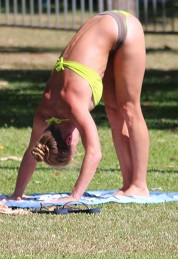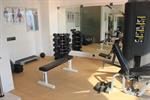
Start or Build a Business as a Personal Trainer.
- Learn to be a Personal Trainer
- Start a business, get a job
Personal Trainer is more often than not a self employed fitness leader who works one on one with clients, providing services that are more in depth and often with a broader scope than what a typical gym based fitness leader might offer. In most countries, there are no legal requirements for being a personal trainer; however, there can certainly be risks and legal liability to consider if you are not properly skilled at what you do. A course such as this will take you well beyond the level of training that an average fitness leader will receive. Among other things, this course incorporates Life Coaching training which is recognised through the Association of Coaching.
This school has an arrangement with both OAMPS and Tower Insurance by which graduates can obtain professional indemnity insurance.
Course Contents and Structure
Core Modules
These modules provide foundation knowledge for the Advanced Certificate in Personal Training.
Fitness Leaders Certificate VRE004
Industry Project BIP000
Motivation VBS111
Life Coaching BPS305
Elective Modules
In addition to the core modules, students study any 4 of the following 9 modules.
Sports Psychology BPS106
Advanced Aerobics BRE208
Aquafitness BRE207
Muscles & Movement (Human Biology II) BSC202
What's Covered by this Course?
FITNESS LEADERS CERTIFICATE
-

Exercise Physiology
- Introduction to Health and Fitness
- Exercise Principles and Cardio-respiratory Programming
- Physiology: Digestion, Excretion, Physiological Systems
- Introduction to Biomechanics: The skeleton and muscles
- Biomechanics and Risk
- Aquafitness, exercise, routines, and equipment
- Fitness Program Design
- Delivering A Fitness Program
- Ergogenic Aids to Performance
- Regulating Body Physiology
- Safety, Injury and General Wellbeing
- Fitness Programs for Special Groups
Practicum: Undertake 40 hours of practical at an approved fitness centre (under the supervision of a reputable instructor)
Note: If You Want to Upgrade -This part of the course incorporates Exercise and Fitness Knowledge Level 1 and 2 in the U.K; and ALSO the Australian certificates III and IV in Fitness. ACS has articulation arrangements with partner colleges in both Australia and the UK which allows graduates to obtain accredited fitness leader qualifications in either country (A small amount of additional work and extra fees will apply to upgrade and obtain additional, accredited qualifications).
MOTIVATION
There are 8 lessons in this course:
- Introduction - Describe the nature and scope of motivation, and identify the differences between people that distinguish the application of motivational skills to achieve a successful outcome
- Awareness -Explain the significance of knowledge and understanding to motivation.
- Tangible Rewards - Explain the effect of Tangible Rewards (eg: Money, Services, Goods) as a major motivator.
- Intangible Rewards - Explain the effect of intangible Rewards (eg: Security, Ethics, Gratitude, Belief Systems/Religion, Peer Pressure) as a major motivator.
- Negative Motivators - Explain how actions can be motivated by negative motivators (eg. Pain, Suffering, Discipline, Threats), and distinguish this type of motivation from that achieved through positive motivators.
- Initiating Motivation - Explain how to initiate motivation with an individual or group for a situation not previously confronted.
- Maintaining Motivation - Explain how motivation can be maintained or increased in both successful and unsuccessful environments.
- Applications - Identify a wide range of situations where motivational skills can be applied, and determine an appropriate way to initiate and maintain motivation in each of those situations.
 LIFE COACHING
LIFE COACHING
There are 10 lessons in this course:
- Introduction
- Individual Perception
- A Well Balanced Life
- Coaching Processes
- Coaching Skills
- Coaching and physical well-being
- Coaching and psychological well-being
- Coaching Success
- Goal Setting
- Review and Adjustment
INDUSTRY PROJECT OR WORK EXPERIENCE
This is the final requirement that you must satisfy before receiving your award.
There are two options available to you to satisfy this requirement:
Option 1. If you work in the industry that you have been studying; you may submit a reference from your employer, in an effort to satisfy this industry (ie. workplace project) requirement; on the basis of RPL (ie. recognition for prior learning), achieved through your current and past work experience.
The reference must indicate that you have skills and an awareness of your industry, which is sufficient for you to work in a position of responsibility.
Option 2. If you do not work in the relevant industry, you need to undertake a project as follows.
Procedure for a Workplace Project
This project is a major part of the course involving the number of hours relevant to the course (see above). Although the course does not contain mandatory work requirements, work experience is seen as highly desirable.
This project is based on applications in the work place and specifically aims to provide the student with the opportunity to apply and integrate skills and knowledge developed through various areas of formal study.
Students will design this project in consultation with a tutor to involve industry based activities in the area of specialized study which they select to follow in the course. The project outcomes may take the form of a written report, folio, visuals or a mixture of forms. Participants with relevant, current or past work experience will be given exemption from this project if they can provide suitable references from employers that show they have already fulfilled the requirements of this project.
For courses that involve more than 100 hours, more than one workplace project topic may be selected. For example, 200 hours may be split into two projects each of 100 hours. This will offer the student better scope to fulfill the needs of their course and to meet the number of hours required. Alternatively, the student may wish to do one large project with a duration of 200 hours.
Students will be assessed on how well they achieve the goals and outcomes they originally set as part of their negotiations with their tutor. During each 100 hours of the project, the students will present three short progress reports. These progress reports will be taken into account when evaluating the final submission. The tutor must be satisfied that the work submitted is original.
If the student wishes to do one large 200 hour report, then only three progressive reports will be needed (however the length of each report will be longer).
ELECTIVES
These are designed to build extra skills which compliment job in fitness, personal training, sports or coaching.
A range of options are offered, to provide students the change of pursuing areas of specific relevance or interest to them. This way every student can build a slightly different set of skills, differentiating themselves from others in industry, and allowing them to develop a reputation as a "specialist" fulfilling a niche that is different to others.
Scope of the Health and Fitness Industry
Health and Fitness are simply some of many the different words used to describe people being in good condition. There are many different services and products on offer which promise to improve or maintain a state of well being, and any (or all) of these goods and services might be considered to be part of the health and fitness industry. These can include things as variable as medical services through to sport, recreation, food and natural therapies.
The Health and Fitness industry is not a clearly defined industry. It does have many aspects to it, and it does overlap into many different fields. Your perception of the scope of this field may be limited as you commence this course; but on completing the course it should have broadened considerably; and in doing so your prospects for employment should have also broadened.
The following are just some of the organisations/businesses which might employ people with management skills in the health and fitness industry:
- Recreation Centres
- Gymnasiums
- Swimming Pools
- Sporting Clubs
- Medical Practitioners
- Chiropractors or Naturopaths
- Health Food Shops
- Health food manufacturers
This is a short list as well as Gymnasium or Sports equipment businesses (retailers or manufacturers), Resorts, Hotels, Tourist industry, and Schools.
There are also many different forms of working with the body for better physical fitness. Modalities such as calisthenics, jogging, and weight training were some of the first forms that became popular. Through the years, many other forms have developed such as aerobics, yoga (which has actually been around for centuries), Pilates and then hybrids from each of these such as yogalates, body pump, and water aerobics as well as many other forms of exercising the body.
Reasons for Fitness
Physical fitness is the capability of the heart, blood vessels, lungs and muscles to function at optimal efficiency - Fitness is broader than just this though! A person's mental attitude towards life is another aspect of fitness. Mental stress (pressures from situations at work, home etc.) can affect a person's fitness just as much as malnutrition or a physical injury. Stress is very often related to physical fitness.
A stressed person can have difficulty with muscles etc. tensing or pulling where they should not pull, placing pressure on nerves, bones etc., and leading to other problems. Allergies to foods, dust, even the common bacteria which can occur in everyone's throat can pose problems to a person’s fitness, or complicate already existing problems.
The single most important fact to understand about human fitness is the complexity of the human body, and the fact that this complexity makes fitness a multi-faceted thing. (You will never be fit by just eating right, or just exercising).

In a nutshell, fitness comes only by developing a balanced approach to life in all of the important spheres of life.
Example:
- Eat healthy foods which you are not allergic or sensitive to, which provide all the necessary nutrients in adequate but not excessive amounts
- Exercise all of the parts of the body regularly and adequately
- Know how to relax, to rest the body both physically and mentally
What Can You do to Improve Your Career Prospects?
- Specialise in an area of fitness that you are passionate about – be open to learning and use this specialist knowledge to differentiate yourself from others in the industry. Today we need to keep learning and studying in order to keep up with a world that is rapidly changing. Learning is a lifelong experience. Study a course that makes you stand out - any learning that is different to others in the industry gives you an edge over your competition.
- Network with people in the industry, attend conferences, industry meetings and trade shows – make yourself known to people in the industry in general.
- Develop a more diverse range of skills – multi-skilled people catch the eye of a client.
- Promote yourself through social media, writing for the media or any other opportunities that arise.
- Recognise your weaknesses and work on improving them - not just academically. And also know your strengths and demonstrate them.